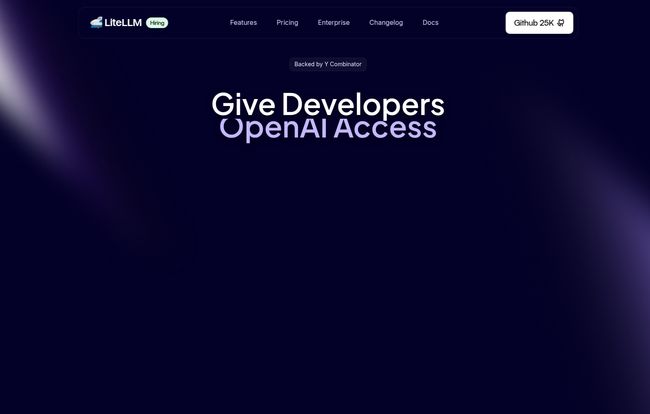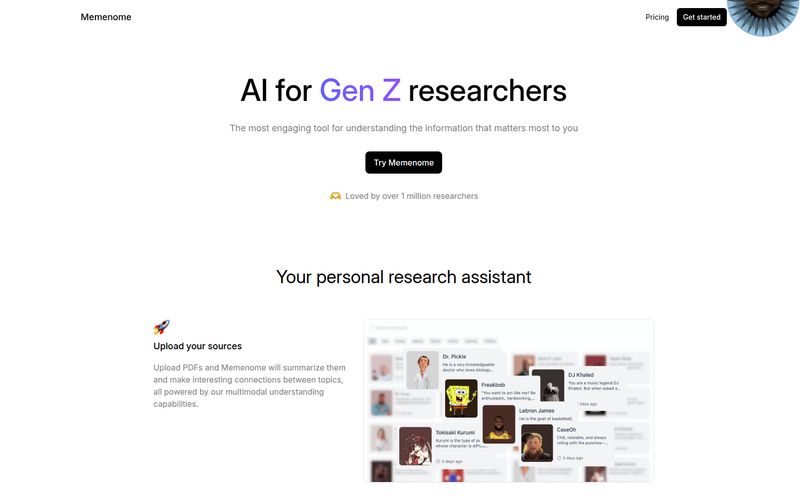Building with AI right now feels a bit like the Wild West. One day you're all in on OpenAI, the next day Anthropic drops a new Claude model that's just perfect for your use case. Then you've got Cohere, Google's Gemini, and a dozen other open-source heroes on Replicate. It's exciting, sure, but it's also a complete mess. Each one has its own API quirks, its own pricing structure, its own way of throwing a tantrum when it's overloaded.
It's the modern developer's Tower of Babel. We're all trying to build amazing things, but we're speaking different API languages. For years, I've seen teams build these rickety, custom-coded bridges to try and manage it all. It's usually a pile of spaghetti code held together with hope and a whole lot of `try-except` blocks.
So when I started hearing whispers about a tool called LiteLLM, my cynical-veteran-blogger ears perked up. Another solution promising to unify everything? Yeah, I've heard that one before. But this one had some serious street cred—backed by Y Combinator and boasting a GitHub repo with thousands of stars. Okay, you have my attention. I decided to take a look.
So, What Exactly is LiteLLM?
In the simplest terms, LiteLLM is an LLM Gateway. Think of it like a universal adapter for your AI toolkit. Or maybe a better analogy is a super-smart switchboard operator for a massive office building filled with different AI models.
You make one simple call to the LiteLLM 'switchboard'. You tell it, "Hey, I need to talk to Claude 3 Haiku," or "Get me GPT-4o on the line." LiteLLM takes your request, translates it into the specific format that model understands, sends it off, gets the response, and translates it back into a single, consistent format for you. No more wrestling with different SDKs or response objects. It's all just clean, predictable, and frankly, a huge relief.
It acts as a proxy layer that sits between your application and the 100+ LLMs it supports. This central position is what gives it its power. It sees every request, every response, every token. And that lets it do some pretty magical things.
The Features That Actually Matter for Developers
A long feature list is great for marketing, but as people in the trenches, we only care about what saves us time and prevents headaches. LiteLLM has a few features that are genuine game-changers.
A Consistent API for Everything
This is the big one. The main event. If you've ever written code for OpenAI's API, you can use LiteLLM. It standardizes all calls to mimic the OpenAI `chat/completions` format. This means you can switch the underlying model from `gpt-3.5-turbo` to `claude-3-sonnet` by changing a single string in your code. No refactoring. No new libraries. Nothing. It's a massive productivity boost and it makes your application incredibly flexible and future-proof.
You're no longer locked into a single provider. If a new, better, cheaper model comes out tomorrow? You can test it and deploy it in minutes. That’s not just convenient; it’s a strategic advantage.

Visit LiteLLM
Finally, Sensible Cost Tracking and Budgeting
Have you ever had that heart-stopping moment at the end of the month when you open your cloud or AI provider bill? I have. It's not fun. LiteLLM puts you back in control. Because it's the central gateway for all your calls, it can track usage with incredible detail. You can see costs broken down by model, by project, or even by individual API key.
Want to give a specific team a $500 monthly budget? You can do that. Want to cut off an API key if it exceeds a certain spend? Easy. For agencies or larger companies trying to attribute costs to different departments, this isn't just a nice-to-have, its absolutely essential.
Never Let Your App Go Down with LLM Fallbacks
APIs fail. It's a fact of life. We saw it with the big OpenAI outage not too long ago. If your entire product relies on one model from one provider, an outage means your entire product is down. LiteLLM offers a beautifuly simple solution: fallbacks.
You can configure a list of models. If your first choice (say, `gpt-4o`) fails to respond, LiteLLM will automatically retry the request with your second choice (`claude-3-opus`), and then your third (`gemini-pro`), and so on. This introduces a level of reliability and resilience that would be a major engineering project to build yourself. With LiteLLM, it's just a few lines in a config file.
The Good, The Bad, and The Realistic
No tool is perfect, right? It’s important to look at this with open eyes. I’ve seen enough hype cycles to know that there's always a tradeoff.
The upsides are pretty clear. The flexibility to use any model, the robust cost control, the increased reliability—it's a powerful combination. It’s open source, which is a huge plus for trust and customisation. The fact that companies like Netflix and Roku are using it, as seen on their homepage, speaks volumes. You dont get that kind of adoption without a solid product.
But what about the reality check? First, it’s not magic. You do have to set it up. It's another piece of infrastructure in your stack that needs to be deployed and managed. It's not difficult, especially with Docker, but it's not zero-effort either. Second, any proxy layer will introduce a tiny bit of performance overhead. We're talking milliseconds here, but for hyper-sensitive applications, it's something to be aware of. And finally, while the core product is free and open-source, the most advanced features like SSO, custom SLAs, and dedicated enterprise support are part of a paid plan.
What's the Damage? A Look at LiteLLM's Pricing
This is where I did a bit of digging. I went looking for a dedicated pricing page and, amusingly, hit a 'Page Not Found' error. At first I thought it was a broken link, but I think it’s actually by design. They're keeping it simple.
Based on the information available, the pricing structure is straightforward and developer-friendly:
| Plan | Price | Best For |
|---|---|---|
| Open Source | $0 / Free | Individual developers, startups, and anyone who wants to self-host and manage their own LLM gateway with all the core features. |
| Enterprise | Contact for Pricing | Larger organizations that need advanced features like SSO, Audit Logs, JWT Auth, and dedicated enterprise-level support with SLAs. |
This is a model I can get behind. The core functionality is free for everyone to use and build upon. If you're a big company that needs the white-glove treatment and security integrations, you pay for it. Seems fair to me.
Who is LiteLLM Actually For?
After playing around with it and thinking about its place in the ecosystem, I feel like LiteLLM is a perfect fit for a few key groups:
- Platform Engineering Teams: For large companies, LiteLLM is the perfect tool to provide a unified, secure, and observable entry point to LLMs for all their internal developer teams.
- AI-Powered Startups: If you're building a product on top of LLMs, you'd be crazy to lock yourself into one provider. LiteLLM gives you the agility to always use the best model for the job without constant re-engineering.
- Indie Developers & Hackers: The free, open-source nature means you can get enterprise-grade features like fallbacks and cost tracking on your personal projects without paying a dime.
- Digital Agencies: Managing API keys and costs for multiple clients is a nightmare. LiteLLM could centralize all of that, making billing and reporting a breeze.
Frequently Asked Questions about LiteLLM
- How does LiteLLM actually work?
- It acts as a server or proxy that you deploy. Your application sends a standard OpenAI-formatted API request to your LiteLLM server. LiteLLM then translates that request into the specific format required by the target LLM (like Anthropic's Claude or Google's Gemini), sends it, gets the response, and translates it back into the OpenAI format before returning it to your app.
- Is LiteLLM really free?
- Yes, the core LiteLLM software is open-source and completely free to use. You can self-host it and get access to most of its powerful features. There is a paid Enterprise version for companies that need features like SSO and dedicated support.
- Does it support models other than OpenAI's?
- Absolutely! That's its main purpose. It supports over 100 different LLMs, including those from Anthropic (Claude), Google (Gemini), Cohere, Mistral, and many others available through platforms like Azure, Bedrock, and Replicate.
- Will LiteLLM slow down my application?
- Any proxy introduces a very small amount of latency. However, for most applications, the overhead from LiteLLM is negligible (typically in the low milliseconds). The benefits of reliability, fallbacks, and standardized access usually far outweigh this tiny performance cost.
- How hard is it to set up LiteLLM?
- If you're comfortable with Docker, it's quite straightforward. The documentation provides clear instructions for getting a proxy server running in minutes. Configuration is done via a simple YAML file.
So, is it the One Ring?
So, back to my original question. Is LiteLLM the one ring to rule all LLMs? I think the analogy almost fits. It’s not about dark magic and ruling over Middle-earth, but it is about bringing order to chaos. It takes the fragmented, confusing world of large language models and unites them behind a single, simple, powerful interface.
For any serious developer or team working with multiple AI models today, a tool like LiteLLM isn't just a convenience—it's becoming a necessity. It's the kind of smart, practical infrastructure that lets you stop worrying about plumbing and get back to building amazing things. And for that, it gets a strong recommendation from me.



